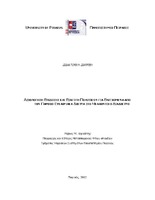Αξιολόγηση επίδοσης και εξαγωγή πολιτικών για ελεγχόμενα από τον πάροχο ευκαιριακά δίκτυα στο μελλοντικό διαδίκτυο
Performance evaluation and policy derivation for operator-governed opportunistic networks in the future internet

View/
Subject
Διαδίκτυο (Internet) ; Τεχνολογία -- Ανάπτυξη ; Αρχιτεκτονική ηλεκτρονικών υπολογιστών ; Δίκτυα υπολογιστών ; Προσομοίωση ; Wireless communication systemsAbstract
Over the last 30 years the Internet has change radically our economy and society. Thereby from an academic network used by a few people in the early 1980s, the Internet became a truthfully worldwide open network for information, communication and commerce. In the light of the rapid spread of technology, particularly broadband networks and mobile communications, the Internet has become a central part of our lives in all sorts of ways and has also replaced traditional channels in many activities between people. The Internet has become a driver of 21st century society. In the near future, the Internet will probably set the networks under stress for resources. In the scope of the Future Internet (FI), new applications, services and content will require a truly ubiquitous network capacity, capable of handling the amplified data traffic volumes transmitted by internet enabled devices. At the same time these new applications are going to be accessed at any time of a day, will be requested from all types of locations and environments and finally will have to be delivered meeting a set of QoS. On the other hand the number of broadband users around the world seems to explode dramatically, leading also to the increase of the total amount of energy consumption. Such a challenging landscape in the area of wireless/mobile networks motivates the quest for more flexible networking paradigms that will offer increased efficiency in resource utilization and application QoS provisioning and at the same time exhibit lower transmission powers and energy consumption, thus achieving "green" targets. Framed within above, this dissertation presents an approach for addressing and providing solutions for the aforementioned issues. The proposed solution is based on dynamically created, operator-governed and coordinated, temporary infrastructure-less extensions of the infrastructure, called Opportunistic Networks (ONs). ONs are governed by operators through the provision of policies, e.g. upon resource usage, as well as context/profile information and knowledge, which is exploited for their creation and maintenance. They are dynamically created in places and at the time they are needed to deliver application flows to mobile users. Moreover, they comprise various devices/terminals, potentially organized in an ad hoc mode, as well as elements of the infrastructure itself. Due to the highly dynamic nature of the environment, including traffic and applications issues, as well as the potential complexity of the infrastructure, a solution that incorporates self-management and learning mechanisms are deemed essential. In this respect, Cognitive Management Systems (CMSs), rendering both self-management and learning capabilities seem appropriate for ensuring the fast and reliable establishment of ONs. In the context of this dissertation and in order to meet the requirements, for improved efficiency in resource provisioning and providing users with high quality services anytime, anywhere through the combination of ONs and CMSs, a new Functional Architecture (FA) for the management and control of the ONs is proposed. Considering the above, in this dissertation is presented the performance evaluation of ONs as an extension to the infrastructure network in various scenarios. Particularly, the investigation under which circumstances (why, where and when) the creation of an ON will be beneficiary for the overall network is presented in certain scenarios. This is actually done by recognizing that the first step prior to proceeding with the establishment of an ON is to be able to judge the suitability of doing so. The study is mainly based on extensive network simulations, with the intention to cover a large gamut of cases in order to increase the validity of the finally extracted conclusions and recommendations. Eventually, it is presented the process of the properly exploitation of the extracted simulation results so as to derive policies that can be used by the operator of the wireless infrastructure to control the decision upon forming the ONs, while in operation or even in a proactive manner.


